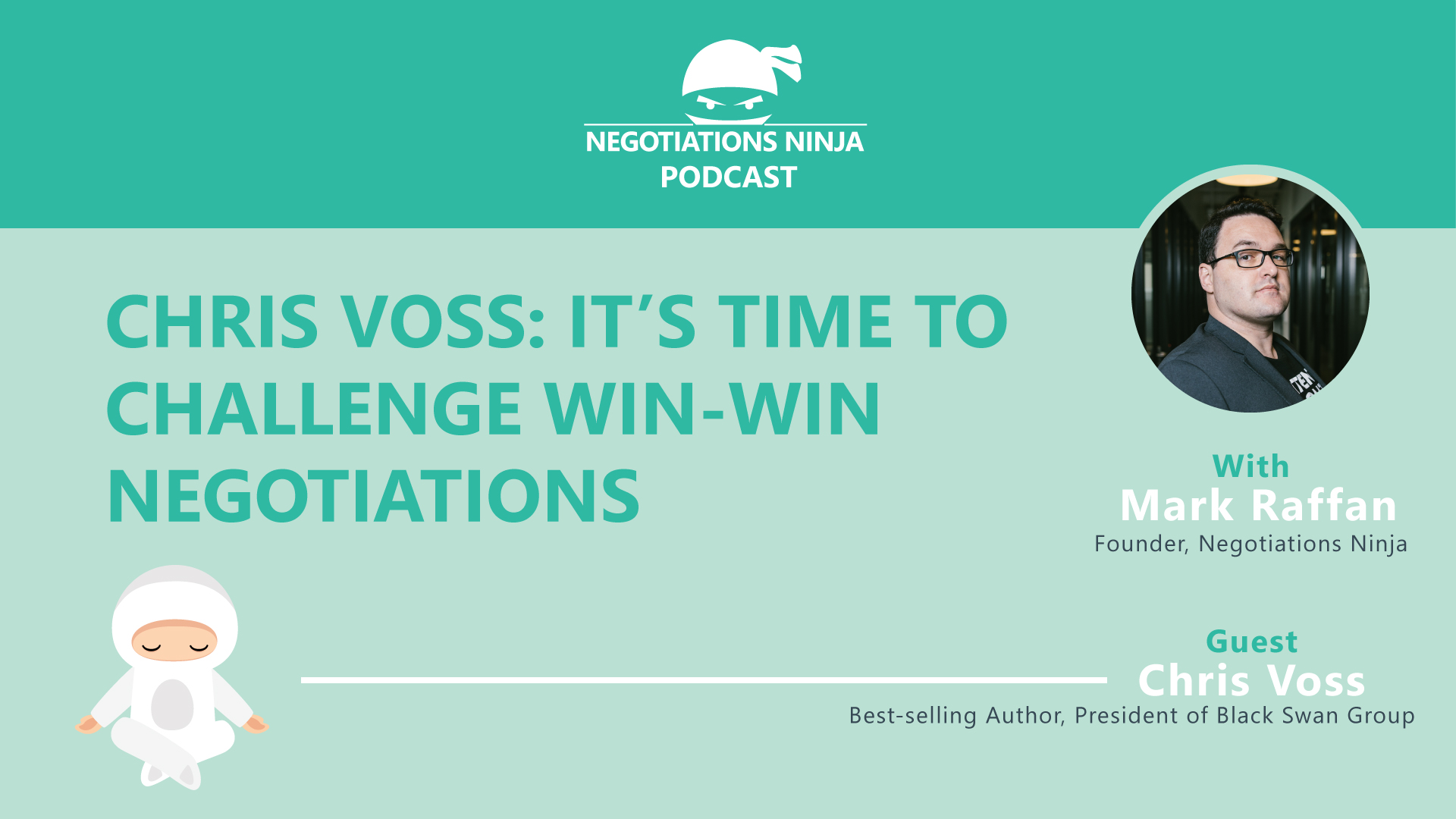What is a win-win negotiation? Is it even appropriate to think a win-win negotiation is achievable? The fantastic Mr. Chris Voss, author of Never Split the Difference, returns to the Negotiations Ninja podcast. Chris was the FBI’s Chief International Hostage Negotiator for many years and is an author and prolific speaker. In this episode, we challenge the widely-held belief of a win-win negotiation.
What does it look like when we move away from win-win negotiations to mutually beneficial negotiations? Should we be more or less transparent about what we want to achieve by the end of a negotiation? Is leverage something we should stop using as a consideration in negotiations? What are our responsibilities as a negotiator? Chris Voss talks about all this and more while sharing real-life examples from his distinguished career. Do NOT miss this.
Outline of This Episode
- [0:35] Chris Voss returns!
- [1:58] Chris Voss’s background
- [3:16] What Chris believes win-win negotiation is
- [5:31] Is the definition of win-win too myopic?
- [8:08] Win-win: ideology versus reality
- [12:13] Engage in more transparent negotiations
- [13:28] There’s no such thing as leverage
- [14:15] A successful negotiation is NOT based on the outcome
- [16:25] Why the goal should be ‘long-term greedy’
- [19:20] Yes means nothing without the how
- [21:19] What’s happening at Black Swan
There are two types of people with a win-win mindset
Chris beliefs someone using the term “win-win” are either:
- A throat cutter
- Or someone whose throat is being cut
What does that mean? If someone wants a win-win negotiation, it comes out of their mouth early in the conversation. They want you to drop your guard. Using those words gets some people to give things up in advance. When a throat-cutter uses those terms—someone hoping for a win-win scenario drops their guard—they get what they want. The other party gets sheared on regularly.
Win-win negotiations: ideology versus reality
Value cannot be split 50/50. The definition of win-win is too myopic. To decide in advance what is a win-win for your counterpart means you think you know everything—which is never true. Chris points out that “There is always hidden information.” You can’t run that through a spreadsheet.
The process has to be collaborative. But the other side might be trying to cheat you before you cheat them. They want to claim as much value as they can. There is never going to be a win-win with these kinds of people. Their goal will always be to exploit you. Putting a win-win into this environment is asking for trouble.
Shoot for a mutually beneficial negotiation
In Chris’s experience, value is created or split—but it’s never equal. Someone will always walk away with more value. That doesn’t mean it can’t be mutually beneficial. Chris shares an example of a negotiation where he agreed to speak at a conference for free. His normal fee is ridiculously high. But this was when the book was just coming out and they agreed to buy 300 books. They also had a separate budget to shoot video of him speaking—when he didn’t have much footage.
They were a local chapter of a national organization that had a national newsletter. They put a Q&A article in the newsletter which exposed him to 20,000+ people in the organization. They gave him something—that he couldn’t get—that was highly valuable to him. Some people might call that a win-win scenario. But neither of them walked in with a win-win attitude. Chris said he was open to brainstorming to come up with better ideas and they both shared what they wanted.
There’s no such thing as leverage—only influence
Chris believes that there’s no such thing as leverage. There’s only influence and what you think you need to have. People are taking themselves hostage because they “Have to have this” or “If I tell them this, I can’t say no.” It’s all in how you perceive the dynamics and how you look at the process—it’s in the eye of the beholder.
If we say “win-win” we are putting ourselves in a position where the other party needs to win as well. We make ourselves responsible for their success. If we made a deal at all you are by definition better off. What’s your perception of how much you want? Did you feel heard? Did you feel understood?
Chris points out that a negotiation hinges on human-nature responses: “If I give you something you desperately needed but I gave it to you easily—you’re going to devalue it.” You have to feel engaged with and heard and treated fairly for you to accept the outcome. It has nothing to do with what the outcome was but is based on our perception of how the process was.
Your responsibility is to be ‘long-term greedy’
How does your counterpart feel after the deal is over? Are they happy with the outcome or do they feel slighted? Chris points out that you want to keep your pipeline full. If you’re consistently exploiting your counterparts that pipeline is going to dry up.
So what is best for your business long-term? Chris says you must “Always deliver value in excess of what you charged anyway.” If it’s always a great deal for the other side—no matter how much money you made.
“If your business is to always over-deliver there is no limit on how profitable you can be. That’s how you’re long-term greedy: Over-deliver, make great deals, leave the other side better-off, and make a lot of money while you’re at it.”
Resources & People Mentioned
Connect with Chris Voss
Episode Sponsor:
- ProcureCon Contingent Staffing
- Code: NN-PCS-2019 for 25% off
Connect With Mark
- Follow Negotiations Ninja on Twitter: @NegotiationPod
- Connect with Mark on LinkedIn
- Follow Negotiations Ninja on LinkedIn
- Connect on Instagram: @NegotiationPod




